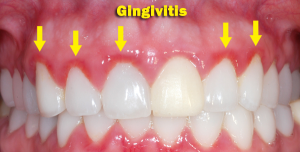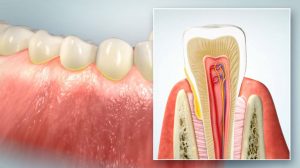Gingivitis And Signs Of Gingivitis 5
Gingivitis signs include: mouth sores, gums that are swollen and tender to the touch, bleeding gums when you brush your teeth and sensitivity when eating. It is also a key cause of tooth decay. These signs should not be taken lightly as gingivitis can become more serious and cause receding gums, infection and tooth loss. What causes gingivitis?
Gingivitis is caused by bacteria in your mouth. Plaque is the sticky film on your teeth made up of this bacteria. It occurs on your teeth when the sugar and starch in your food comes in contact with the bacteria living in your mouth. This buildup of plaque starts out soft and eventually hardens on your teeth. It’s this plaque and microscopic food particles that slowly accumulate around the gum line that causes irritation and gingivitis. Because tooth plaque contains bacteria, the chance for infection is likely. The possibility of a tooth abscess can also develop, which accelerates the rate of bone destruction. If left untreated, gingivitis can develop into a serious gum disease – periodontal disease .
 This is when inflammation and Infection spreads from the gums (gingiva) to the ligaments and bone that are supporting the teeth. If there is any loss of support to these structures, the teeth become loose and eventually fall out. Periodontitis is a primary cause of tooth loss in adults. You don’t want it to reach this stage because the treatment is not pleasant and tooth replacement can be quite expensive. What can you do to prevent gingivitis? Maintain good oral hygiene! -At the earlier stages of gingivitis, it is possible to reverse this condition by practicing good dental care and using a mouthwash.
This is when inflammation and Infection spreads from the gums (gingiva) to the ligaments and bone that are supporting the teeth. If there is any loss of support to these structures, the teeth become loose and eventually fall out. Periodontitis is a primary cause of tooth loss in adults. You don’t want it to reach this stage because the treatment is not pleasant and tooth replacement can be quite expensive. What can you do to prevent gingivitis? Maintain good oral hygiene! -At the earlier stages of gingivitis, it is possible to reverse this condition by practicing good dental care and using a mouthwash.
- By keeping your mouth clean, the gums will eventually heal. If your gums aren’t too swollen or in pain, you can carefully brush the gums as well.
- Using a gum stimulator will also help to firm the gum tissues and remove bacteria.
- Brush your teeth at least twice a day, floss your teeth (gently), eat healthier – more fruits and vegetables.
- Be sure to check in with your dentist at least twice in a year for a good cleaning.

